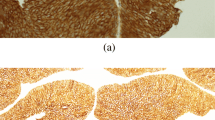Abstract
The prognostic significance of p53 accumulation and MDM2 overexpression in superficial and papillary urothelial cell carcinoma (UCC) of the bladder has not yet been established. Therefore, MDM2 and p53 protein were investigated focusing on tumour grade and muscularis mucosae invasion in order to identify their prognostic significance. Thirty-five archival UCC were studied by immunohistochemistry using monoclonal antibodies DO7 against p53, and IB10 against MDM2. MDM2 overexpression was observed in 51.4% of the cases. The recurrence rate for patients with MDM2 overexpression was 7.09 fold higher than for those without MDM2 overexpression. p53 accumulation was not related to prognosis. There was no significant difference between low and high grade tumours in regard to MDM2 overexpression and p53 accumulation. pTa cases presented the higher frequency of MDM2 positive cases (66.7%) and a lower frequency of p53 accumulation (33.3%). MDM2 overexpression does not seem to be related to muscular mucosae invasion. Thus, MDM2 status may well be a prognostic marker in superficial urothelial bladder carcinomas.
Resumen
El significado pronóstico de la expresión aumentada de MDM2 y de la acumulación de p53 en carcinomas de células uroteliares superficiales y papilares (UCC) de la vejiga no está totalmente esclarecido. Es importante, portanto, investigar la presencia de las proteínas MDM2 y p53 en función del grado y de la invasión de la lámina propia en estos tumores con el fin de identificar su significado pronóstico.
Se ha estudiado material de archivo de 35 UCC mediante imunohistoquímica utilizando el anticuerpo monoclonal DO7 para p53 y el IB10 para MDM2.
Se observó una expresión aumentada de MDM2 en el 51,4% de los casos, encontrándose correlación con la tasa de recurrencia y de supervivencia libre de recurrencia. La acumulación nuclear de p53 no fue relacionada con el pronóstico. Estos marcadores no distinguieron significativamente los tumores superficiales de alto y bajo grado. Se encontró que los casos de estadio pTa eran los que presentaban una mayor frecuencia de sobreexpresión para la MDM2 (66,7%) mientras que estos casos tenían la menor frecuencia de acumulación de p53 (33,3%). Aparentemente la sobreexpresión de MDM2 no está relacionada con la invasión de la muscularis mucosae.
El análisis de MDM2 parece ser un marcador pronóstico en carcinomas uroteliares superficiales de vejiga.
Similar content being viewed by others
References
Pow-Sang JM, Seigne JD. Contemporary management of superficial bladder cancer. Cancer Control 2000; 7: 335–9.
Millán-Rodríguez F, Chechile-Toniolo G, Salvador-Bayarri J, Palou J, Vioente-Rodríguez J. Multivariate analysis of the prognostic factors of primary superficial bladder cancer. J Urol. 2000; 163: 73–8.
Murphy WM. The term superficial bladder cancer should be abandoned. Eur Urol. 2000; 38: 597–9.
Neal DE. Advances in bladder cancer. Tumours in urology. London: Springer-Verlag; 1994. p. 3–18.
Angulo JC, López JI, Grignon DJ, Sánchez-Chapado M. Muscularis mucosa differentiates two populations with different prognosis in stage T1 bladder cancer. Urology 1995; 45: 47–53.
Slaton JW, Benedict WF, Dinney CP. P53 in bladder cancer: mechanism of action, prognostic value, and target for therapy. Urology. 2001; 57: 852–9.
Bernardini S, Billerey C, Martin M, Adessi GL, Wallerand H, Bittard H. The predictive value of muscularis mucosae invasion and p53 over expression on progression of stage T1 bladder carcinoma. J Urol. 2001; 165: 42–6.
Lozano G, de Oca Luna RM. MDM2 function. Biochim Biophys Acta. 1998; 1377:M49–54.
Finlay CA. The mdm-2 oncogene can overcome wild-type p53 suppression of transformed cell growth. Mol Cell Biol. 1993; 13: 301–6.
Leach FS, Tokino T, Meltzer P, et al. p53 mutation and MDM2 amplification in human soft tissue sarcomas. Cancer Res. 1993; 53: 2231–4.
Momand J, Jung D, Wilczynski S, Niland J. The MDM2 gene amplification database. Nucleic Acids Res. 1998; 26: 3453–9.
Lianes P, Orlow I, Zhang ZF, et al. Altered patterns of MDM2 and TP53 expression in human bladder cancer. J Natl Cancer Inst 1994; 86: 1325–30.
Barbareschi M, Girlando S, Fellin G, Graffer U, Luciani L, Dalla Palma P. Expression of mdm-2 and p53 protein in transitional cell carcinoma. Urol Res. 1995; 22: 349–52
Schmitz-Drager BJ, Kushima M, Goebell P, et al. p53 and MDM2 in the development and progression of bladder cancer. Eur Urol. 1997; 32: 487–93.
Epstein JI, Amin MB, Reuter VR, Mostofi FK and Bladder consensus conference committee. The World Health Organization/International Society of Urological Pathology Consensus Classification of Urothelial (Transitional Cell) Neoplasms of the Urinary Bladder. Am J Surg Pa-thol. 1998; 12: 1435–48.
Sobin IH, Wittekind C. TNM Classification of malignat tumours. 5th ed. New York: John Wiley & Sons, Inc: 1997.
Pfister C, Moore L, Allard P, et al. Predictive value of cell cycle markers p53, MDM2, p21, and Ki-67 in superficial bladder tumor recurrence. Clin Cancer Res. 1999; 5: 4079–84.
Jahnson S, Karlsson MG. Tumor mapping of regional immunostaining for p21, p53, and mdm2 in locally advanced bladder carcinoma. Cancer. 2000; 89: 619–29.
Korkolopoulou P, Christodoulou P, Kapralos P, et al. The role of p53, MDM2 and c-erb B-2 oncoproteins, epidermal growth factor receptor and proliferation markers in the prognosis of urinary bladder cancer. Pathol Res Pract. 1997; 193: 767–75.
Ozdemir E, Kakehi Y, Okuno H, Habuchi T, Okada Y, Yoshida O. Strong correlation of basement membrane degradation with p53 inactivation and/or MDM2 overexpression in superficial urothelial carcinomas. J Urol 1997; 158: 206–11.
Cordon-Cardo C, Zang Z, Dalbagni G, et al. Cooperative effects of p53 and pRb alterations in primary superficial bladder tumours. Cancer Res. 1997; 57: 1217–21.
Grossman HB, Liebert M, Antelo M, et al. p53 and RB expression predict progression in Tl bladder cancer. Clin Cancer Res. 1998; 4: 829–34.
Shiina H, Igawa M, Shigeno K, et al. Clinical significance of mdm2 and p53 expression in bladder cancer. A comparison with cell proliferation and apoptosis. Oncology 1999; 56: 239–47.
Honda R, Yasusa H. Association of p19 (ARF) with Mdn2 inhibits ubiquitin ligase activity of Mdm2 for tumor suppressor p53. EMBO J. 1999; 18: 22–7.
Xirodimas D, Saville MK, Edling C, Lane DP, Lain S. Different effects of p14ARF on the levels of ubiquitinated p53 and Mdm2 in vivo. Oncogene 2001; 20: 4972–83.
Oliner JD, Kinzler KW, Meltzer PS, George DL, Vogelstein B. Amplification of a gene encoding a p53-associated protein in human sarcomas. Nature 1992; 358: 80–3.
Cheng YT, Li YL, Wu JD, et al. Overexpression of MDM-2 mRNA and mutation of the p53 tumor suppressor gene in bladder carcinoma cell lines. Mol Carciog 1995; 13: 173–81.
Habuchi T, Kinoshita H, Yamada H, et al. Oncogene amplification in urothelial cancers with p53 gene mutation or MDM2 amplification. J Natl Cancer Inst 1994; 86: 1331–5.
Landers JE, Cassel SL, George DL. Translational enhancement of mdm2 oncogene expression in human tumor cells containing a stabilized wild-type p53 protein. Cancer Res. 1997; 57: 3562–8.
Haines DS. The mdm2 proto-oncogene. Leuk Lymphoma 1997; 26: 227–38.
Ganguli G, Abecassis J, Wasylyk B. MDM2 induces hyperplasia and premalignant lesions when expressed in the basal layer of the epidermis. EMBO J 2000; 19: 5135–47.
Reinke V, Bortner DN, Amelse LL, et al. Overproduction of MDM2 in vivo disrupts S phase independent of E2F1. Cell Groth Differ. 1999; 10: 147–54.
Santos L, Amaro T, Jeronimo C, et al. Low grade transitional cell carcinoma of the bladder: prognostic value of immunoreactivity for p16, p27, pRb, p53, Ki-67 and b12-10D1. Eur J Cancer. 1999; 35 (Suppl 4): 351.
Author information
Authors and Affiliations
Corresponding author
Additional information
Departamento de Oncología Cirúrgica
Unidade de Cirurgia Experimental e Investigação de Tradução (Grupo de Investigação do Cancro da Bexiga)
Serviço Anatomia Patológica
Escola Superior de Saúde
Rights and permissions
About this article
Cite this article
Santos, L.L., Pereira, M.K., Costa, C.S. et al. The prognostic value of MDM2 overexpression in superficial urothelial bladder carcinoma. Rev Oncol 4, 322–326 (2002). https://doi.org/10.1007/BF02832107
Received:
Revised:
Accepted:
Published:
Issue Date:
DOI: https://doi.org/10.1007/BF02832107




